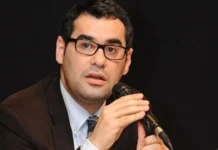A graduate of Istanbul’s prestigious Boğaziçi University had his master’s program acceptance revoked and was banned from campus after protesting the university’s government-appointed rector during his graduation ceremony, the T24 news website reported.
During the ceremony Berat Kaşkaloğlu unfurled a banner that read “Government appointed rectors will leave [the university] but we [the students] will stay.” The university administration subsequently revoked Kaşkaloğlu’s graduate card for allegedly “disrupting the ceremony.”
A graduate card is an identification card given by universities to their graduates that enables them to maintain their ties to the university. The card allows graduates to enter campuses, use facilities like libraries and sports centers and participate in university-organized events.
Kaşkaloğlu was then notified that his master’s program application, which had previously been approved by the department, was being withdrawn. The honors student, who already has published work, called the decision unfair and said he would pursue legal action to contest it.
Boğaziçi University has been a flashpoint for protests since 2021, when President Recep Tayyip Erdoğan first appointed Melih Bulu, a former politician from the ruling Justice and Development Party (AKP), in January of that year, and then Naci İnci, in August 2021, as the university’s rector.
Both appointments sparked protests and criticism for being undemocratic since the university community wanted to see the rector selected as a result of a democratic process rather than an appointment made by Erdoğan. They also objected to the naming of figures considered to be pro-Erdoğan.
Traditionally, one of the top two candidates with the highest share of votes by the university staff was appointed rector by the president. However, this system has drastically changed over the years.
The most recent changes to the appointment of rectors came while Turkey was under a state of emergency after a July 15, 2016 coup attempt. A state of emergency decree (KHK 676) granted the president the authority to appoint rectors without an election, and another decree in 2018 (KHK 703) reduced the requirement for candidates from five years as a professor to three.
Critics have argued that the direct appointment of rectors by the president has curtailed academic freedom and the autonomy of universities from politics.















